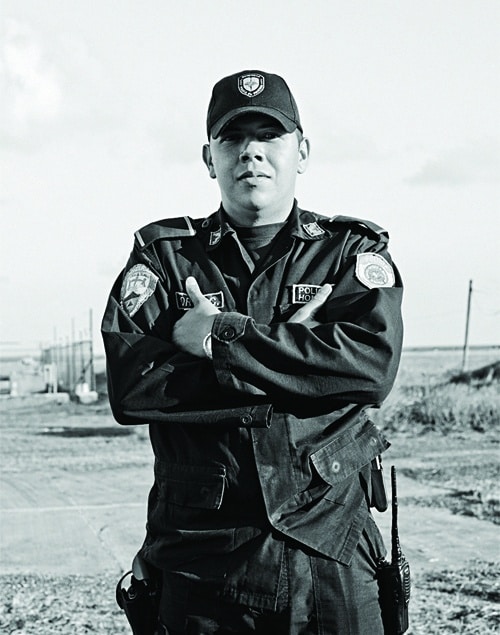Travel Tales: Run-In With Roatan Cops
It's rush hour on roatan's only paved road. Not many cars actually.
But kids walk home from school on it. Men ride bikes on the wrong side of it. Dogs sniff for snacks on it. I'm driving a Suzuki Celerio, the little car that could, dodging one living obstacle after another. The on-road activity eases as I crest a steep hill, but down the other side is a life form I cannot avoid. "Oh, no," I say to photographer Jon Whittle over in the passenger seat. It's a man in uniform, standing in the middle of the road. I'm pretty sure he has a gun on his thigh. And I'm certain that he's pointing his finger at me.
Turns out, this is a simple traffic checkpoint. I'm thinking I'll just pull over, flash a dorky American grin, and we'll be on our way to dinner on the island's west side.
As soon as I roll down the window, I feel a chill in the humid air. The cop's cloudy face blots out my sunny smile. There will be no friendly banter because I don't understand a word he's saying.
"Lo siento," I say with self-pity. "Hablas ingles?" Spanish is the official language of Honduras, and on its island of Roatan. But this is also a former English colony and the English language is commonly used. Perhaps it's used here, on the side of the road.
"No," the cop barks. He then releases a flurry of syllables from deep inside the Honduran dialect. My translation is "You're screwed, you're screwed, you're screwed."
"Driver's license?" I say, gently reaching for my back pocket. "Would you like to see my driver's license?"
He nods. In Roatan, as in the United States, no license means no driving, and maybe a nice tour of the police station. I'm thinking of this as I realize that my wallet isn't in my pocket. It isn't in the dash compartment either. Jon senses my panic and looks around his tiny seat, as if my license might show up on his door handle or inside a water bottle.
"My backpack," I say to the cop, my words and hand gestures form- ing an incomprehensible stew of communication. "Can I get my backpack out of the trunk?"
I walk to the back of the tiny car and stuff my hands into the back- pack. Some pens. Dead batteries.
"Oh, hey, anyone want a choco- late-chip cookie?" I offer. There's no response. No wallet either. At this point a few questions bounce around my head. Will the handcuffs hurt (because I think I tweaked my shoulder paddling a kayak this morning)? Is it taco night at the jailhouse? Why did I leave my wallet in the safe back at the lodge?
I'm about to ask if the squad car has air conditioning when a better question surfaces. "What if he has his license?" I ask, pointing at Jon.
All eyes turn to Jon, slowly pulling out his license. To me it's the dawn of a new day. My freedom. But the positive demeanor that normally colors Jon's face has turned sweaty pink. "I don't know how to drive a stick shift," he mumbles. "Qué?" says the officer, lifting one eyebrow. Jon starts to repeat. "I don't know how to ..." "Gracias, sir!" I say. My facial expression to Jon says, "Zip up that airbag on your face and get in the car!" He walks over to the driver's side, slides in behind the wheel and stares at the shift knob as if he's being asked to shove his hand into a wasp nest.
"I'll teach you," I say, feeling the officer looming just outside my door.
Jon turns the key. Phump-phump. Our heads lurch. The car stalls. "OK, that's a great effort," I say, reaching for some fake encouragement. Jon is my only hope. I can't rattle him.
"This time push the clutch to the floor and release it slowly while ..." Phump-phump. Driver's training is in progress, under the annoyed watch of an armed Latino lawman. Over the next 10 minutes, the Celerio hops three feet. The cop's arms remain crossed. At any moment he could reach in and haul me out by the shirt collar. I'm trying to be calm, but the officer's eyes are locked on me, and deep down I'm screaming at Jon: "Get me out of here now!"
Finally, on the 12th attempt, Jon coordinates the clutch and gas just enough to get the tires turning. The engine is screaming at about 10,000 rpm. After 200 yards it's painfully obvious that we cannot travel across the island in first gear. We have to turn around for my wallet. There's only one paved road on Roatan. And it leads right back past our uniformed friend.
Jon has all four limbs learning a new trick. He's also watching out for school kids and roadside ditches. He finds an area wide enough to make a U-turn, which feels like the teacup ride at the fair. Not quite as exhilarating, though.
Just ahead is the checkpoint, again. The officer does not motion for us to pull over this time, but because we're doing all of 9 mph, he could walk up from behind and wrestle the little car to a stop. "Don't make eye contact," I say to Jon. To my dismay, he looks directly at the cop. He even sticks his hand out the window and waves. He might as well hold a sign: "Hey, remember the guy next to me? Shouldn't he be in jail?" Out of the corner of my eye I see the officer turn away, arms still folded. The whine of the little car's engine must be hurting his ears.
This article first appeared in the January/February 2012 issue of ISLANDS.
